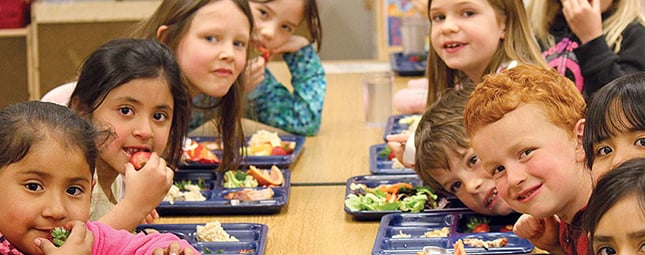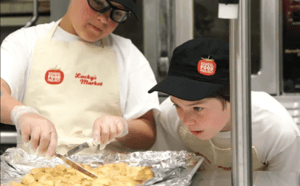Chef Ann Cooper and Leanpath create new food waste engagement tools for elementary schools

Chef Ann Cooper, Director of Nutrition Services for Boulder Valley School District, in Colorado, USA, and founder of the Chef Ann Foundation has worked with Leanpath to reduce food waste across the district. We also recently collaborated on a new curriculum teaching the importance of food waste prevention to elementary school students.
Chef Ann is a recognized leader in transitioning school food programs to more healthy and sustainable menus. She strives to “make the connection between what our kids eat, what’s happening on the planet, and what’s on their plates.”
In order to deepen kids' connection to their food system, and to nurture their growing interest in food waste, Chef Ann collaborated with Leanpath on a four-part student engagement curriculum. The new program provides resources to educate students on the issue of food waste, the importance of measurement, academic projects, and at-home take-aways. These tools and others are available to view on the Boulder Valley School District Food Project website.
“[Our students] are super-excited about it, but they can quickly move on to something new, so you need a great base, and you need to reinforce the process,” noted Chef Ann. She added that “middle schoolers are starting to understand the health of the planet, and by high school, there’s a real understanding. There are points to mobilize, such as the correlation between the food system and climate change.”She further noted that climate activist Greta Thunberg has been a great connector by “giving kids a voice to these issues.”

Laura Smith, Boulder Valley’s Program and Grants Coordinator for the School Food Project, pointed out that the messaging is getting through, noting that “last year some middle schoolers approached us and wanted to talk a little more about what food waste in their schools looked like, what it meant for them, and what they could do to support it and get the conversation spread across their student body – and we love to see that.”
Commenting on integration of food waste reduction efforts, Chef Ann noted that for the children, “whatever you can do that’s hands-on is best, because kids are talked at a lot.” She pointed to the value of tangible actions to spur acceptance, stating that “here we do plate waste studies to get them involved.”
Lessons from this program can be passed on to others considering implementation of a food waste reduction program in schools. Chef Ann recommended finding teachers who are very interested in reducing food waste and engaging them in the process. Smith emphasized the importance of having a champion, or perhaps more than one, in place, adding that “if you can find a cohort of like-minded individuals whether it be teachers, staff, or students to take charge and lead the effort, then there is no stopping them.”
“A few years ago, everyone was talking about ugly produce,” Chef Ann continued. “Now we’re talking about bigger issues, like how to prevent food waste, better utilization of all of the food we have, and allowing ugly produce in our kitchens.”She noted that much of her efforts ultimately center on the importance of properly valuing our food, and the importance of educating our kids accordingly. She concludes, “If we can teach a generation of kids not to waste food, we’ll get great results.”
Sign up for our monthly newsletter to get updates about food waste prevention initiatives, whitepapers, webinars and more.
